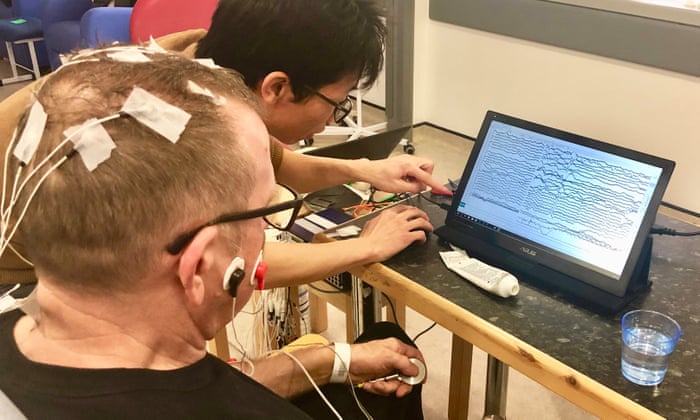
Scientists say mind stimulation may very well be used to deal with nervousness in individuals with Parkinson’s illness, after they made an “thrilling” discovery about mind waves.
Greater than 10 million individuals worldwide reside with Parkinson’s, and about one in three have troublesome nervousness that impacts their day by day life.
Deep mind stimulation (DBS) is already provided as a therapy to assist with the bodily signs of the illness, reminiscent of stiffness, slowness and tremor.
However now specialists are hailing a “unbelievable” breakthrough of their understanding of a particular mind wave, which they are saying “opens the door” to DBS being harnessed to alleviate signs of hysteria.
Dr Lucia Ricciardi, a senior lecturer in neurology at Metropolis St George’s, College of London, and a co-lead writer of the analysis, mentioned: “Nervousness has been recognised as a significant unmet therapeutic want in Parkinson’s illness, and our outcomes now supply hope.
“We present that deep mind stimulation has the potential to have wider-reaching advantages for individuals dwelling with Parkinson’s than we beforehand thought.
“It opens the door for us to discover new and superior neuromodulation remedies tailor-made to particular person sufferers’ wants to alleviate nervousness and a spread of different signs.”
Analysis groups at Metropolis St George’s and the College of California, San Francisco (UCSF) recruited 33 individuals with extreme Parkinson’s who have been having DBS surgical procedure to deal with their bodily signs.
Neurosurgeons implanted tiny electrodes into their brains after which tracked various kinds of mind waves in three completely different settings within the UK and US with completely different gadgets.
Ricciardi mentioned: “We found for the primary time that there’s a powerful connection between mind exercise in part of the mind referred to as the basal ganglia, and nervousness ranges in individuals with Parkinson’s illness.
“After we measured the mind waves, we discovered that greater ranges of a kind of mind wave referred to as theta energy have been linked to extra extreme nervousness.”
The group suspected that there is likely to be some connection between this kind of mind exercise and nervousness, Ricciardi mentioned. “However we have been stunned to see simply how sturdy this hyperlink was. This sturdy hyperlink was discovered throughout three teams of sufferers in several areas with completely different gadgets – which reveals simply how sturdy these outcomes are, which is an thrilling step ahead for us.
“This discovering is unbelievable because it opens new avenues for us to discover, which is able to assist us perceive what’s taking place within the mind to trigger nervousness in Parkinson’s illness.”
Regardless of the large variety of individuals with Parkinson’s who’re affected by nervousness, for many years there was a giant hole in understanding the underlying organic causes, and therapy choices have been restricted.
Ricciardi mentioned: “Though it’s nonetheless early days, our aim is to take this analysis and develop a DBS system that may mechanically regulate to assist handle nervousness. The thought is that by sending focused alerts to the mind, we might help steadiness the exercise that’s associated to nervousness. This might assist individuals really feel much less anxious and enhance their temper.
“Basically, we wish to make a therapy that responds to how the affected person is feeling in actual time, which might result in higher outcomes for these coping with nervousness.”
One of many sufferers who took half within the examine, Jonathan Lovett, mentioned: “It might be an enormous step ahead if DBS might assist cope with non-motor signs reminiscent of nervousness.”
In his case, nervousness was one of many “early markers” of the illness, the 73-year-old from Surbiton, south-west London, mentioned, “a lot in order that I spent nearly two years in evaluation making an attempt to determine why I used to be regularly unhappy and on edge”.
He added: “Parkinson’s is a posh illness, nearly impossibly so, and advances in expertise that permit refined and clever management of the gadgets set to work on mind behaviour, gathering knowledge, distant monitoring, fine-tuning medicine, tendencies and pinch factors may very well be life-changing.”
Dr Simon Little, an affiliate professor of neurology at UCSF, co-led the examine, which was supported by the UK’s Medical Analysis Council and the Nationwide Institutes of Well being within the US.
He mentioned he hoped the invention wouldn’t solely assist individuals with Parkinson’s however may additionally present perception into methods to deal with nervousness in individuals who didn’t have the situation.









